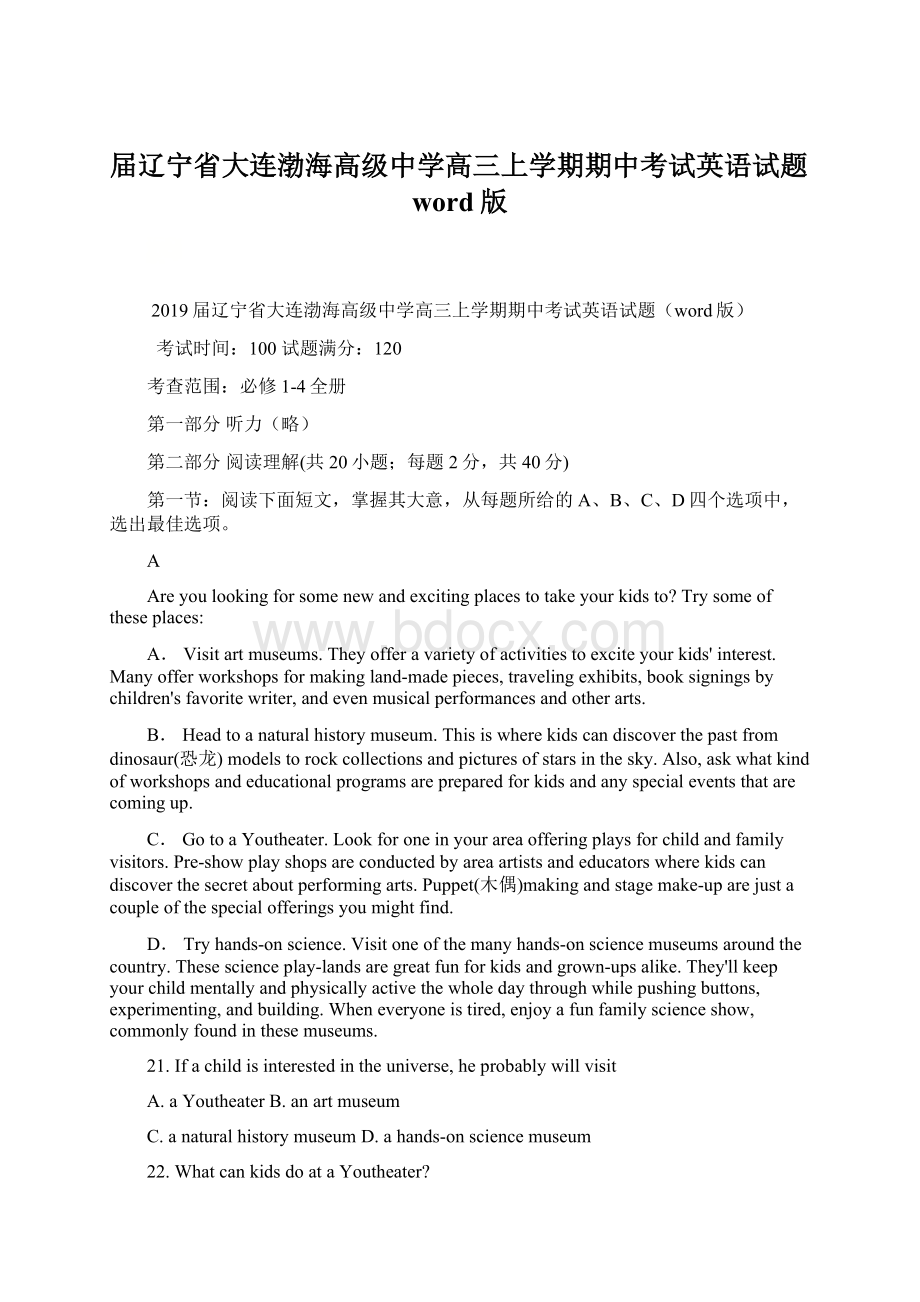届辽宁省大连渤海高级中学高三上学期期中考试英语试题word版.docx
《届辽宁省大连渤海高级中学高三上学期期中考试英语试题word版.docx》由会员分享,可在线阅读,更多相关《届辽宁省大连渤海高级中学高三上学期期中考试英语试题word版.docx(9页珍藏版)》请在冰豆网上搜索。

届辽宁省大连渤海高级中学高三上学期期中考试英语试题word版
2019届辽宁省大连渤海高级中学高三上学期期中考试英语试题(word版)
考试时间:
100试题满分:
120
考查范围:
必修1-4全册
第一部分听力(略)
第二部分阅读理解(共20小题;每题2分,共40分)
第一节:
阅读下面短文,掌握其大意,从每题所给的A、B、C、D四个选项中,选出最佳选项。
A
Areyoulookingforsomenewandexcitingplacestotakeyourkidsto?
Trysomeoftheseplaces:
A.Visitartmuseums.Theyofferavarietyofactivitiestoexciteyourkids'interest.Manyofferworkshopsformakingland-madepieces,travelingexhibits,booksigningsbychildren'sfavoritewriter,andevenmusicalperformancesandotherarts.
B.Headtoanaturalhistorymuseum.Thisiswherekidscandiscoverthepastfromdinosaur(恐龙)modelstorockcollectionsandpicturesofstarsinthesky.Also,askwhatkindofworkshopsandeducationalprogramsarepreparedforkidsandanyspecialeventsthatarecomingup.
C.GotoaYoutheater.Lookforoneinyourareaofferingplaysforchildandfamilyvisitors.Pre-showplayshopsareconductedbyareaartistsandeducatorswherekidscandiscoverthesecretaboutperformingarts.Puppet(木偶)makingandstagemake-uparejustacoupleofthespecialofferingsyoumightfind.
D.Tryhands-onscience.Visitoneofthemanyhands-onsciencemuseumsaroundthecountry.Thesescienceplay-landsaregreatfunforkidsandgrown-upsalike.They'llkeepyourchildmentallyandphysicallyactivethewholedaythroughwhilepushingbuttons,experimenting,andbuilding.Wheneveryoneistired,enjoyafunfamilyscienceshow,commonlyfoundinthesemuseums.
21.Ifachildisinterestedintheuniverse,heprobablywillvisit
A.aYoutheaterB.anartmuseum
C.anaturalhistorymuseumD.ahands-onsciencemuseum
22.WhatcankidsdoataYoutheater?
A.Lookatrockcollections.B.Seedinosaurmodels.
C.Watchpuppetmaking.D.Giveperformances.
23.Whatdoes"hands-onscience"meaninthelastparagraph?
A.Sciencegamesdesignedbykids.B.Learningsciencebydoingthings.
C.Ashowofkids'sciencework.D.Readingsciencebooks.
24.Wheredoesthistextprobablycomefrom?
A.Asciencetextbook.B.Atouristmap.
C.Amuseumguide.D.Anewsreport.
B
OpenLettertoanEditor
Ihadaninterestingconversationwithareporterrecently–onewhoworksforyou.Infact,he’soneofyourbestreporters.Hewantstoleave.
Yourreportergavemeacopyofhisresume(简历)andphotocopiesofsixstoriesthathewroteforyou.Theheadlinesshowedyouplayedthemproudly.Withgreatenthusiasm,hetalkedabouthowhefindsissues(问题),approachesthem,andwritesaboutthem,whichtellsmeheisoneofyourbest.I’msureyouwouldhatetolosehim.Surprisingly,yourreporterisnotunhappy.Infact,hetoldmehereallylikeshisjob.Hehasagreatassignment(分工),andsaidyourunagreatpaper.Itwouldbeeasyforyoutokeephim,hesaid.Heknowsthatthepapervalueshim.Heappreciatestheresponsibilityyou’vegivenhim,takesownershipofhisprofession,andenjoyshisfreedom.
Sowhyishelookingforawayout?
Hetalkedtomebecausehewantshiseditorstodemandsomuchmoreofhim.Hewantstobepushed,challenged,coachedtonewheights.
Thereporterbelievesthatgoodstoriesspringfromgoodquestions,buthiseditorsusuallyaskhowlongthestorywillbe,whenitwillbein,whereitcanplay,andwhatthebudgetis.
Helongsforconversationswithaneditorwhowillhelphimturnhisgoodideasintogreatones.Hewantssomeonetogetexcitedaboutwhathe’sdoingandtohelphimturnhisstoryideaupsidedownandinsideout,exploringthebestwaystoreportit.Hewantstobemorevaluableforyourpaper.That’swhatyouwantforhim,too,isn’tit?
Soyourreporterhassetmethinking.
Ourbesthopeinkeepingourbestreporters,copyeditors,photographers,artists-everyone-istoworkhardertomakesuretheygetthehelptheyaredemandingtoreachtheirpotential.Ifwecan’tdoit,they’llfindsomeonewhocan.
25.Whatdoesthewriterthinkofthereporter?
A.Optimistic.B.Imaginative.C.Ambitious.D.Proud.
26.Whatdoesthereporterwantmostfromhiseditorsintheirtalks?
A.Findingthenewsvalueofhisstories.
B.Givinghimfinancialsupport.
C.Helpinghimtofindissues.
D.Improvinghisgoodideas.
27.Whoprobablywrotetheletter?
A.Aneditor.B.Anartist.C.Areporter.D.Areader.
28.Theletteraimstoremindeditorsthattheyshould________.
A.keeptheirbestreportersatallcosts
B.givemorefreedomtotheirreporters
C.beawareoftheirreporters’professionaldevelopment
D.appreciatetheirreporters’workingstylesandattitudes
C
PacingandPausing
SaratriedtobefriendheroldfriendSteve’snewwife,butBettyneverseemedtohaveanythingtosay.WhileSarafeltBettydidn’tholdupherendoftheconversation,BettycomplainedtoStevethatSaranevergaveherachancetotalk.Theproblemhadtodowithexpectationsaboutpacingandpausing.
Conversationisaturn-takinggame.Whenourhabitsaresimilar,there’snoproblem.Butifourhabitsaredifferent,youmaystarttotalkbeforeI’mfinishedorfailtotakeyourturnwhenI’mfinished.That’swhatwashappeningwithBettyandSara.
Itmaynotbecoincidental(巧合)thatBetty,whoexpectedrelativelylongerpausesbetweenturns,isBritish,andSara,whoexpectedrelativelyshorterpauses,isAmerican.BettyoftenfeltinterruptedbySara.ButBettyherselfbecameaninterrupterandfoundherselfdoingmostofthetalkingwhenshemetavisitorfromFinland.AndSarahadahardtimecuttinginonsomespeakersfromLatinAmericaorIsrael.
Thegeneralphenomenon,then,isthatthesmallconversationtechniques,likepacingandpausing,leadpeopletodrawconclusionsnotaboutconversationalstylebutaboutpersonalityandabilities.Thesehabitualdifferencesareoftenthebasisfordangerousstereotyping(思维定式).Andthesesocialphenomenacanhaveverypersonalconsequences.Forexample,awomanfromthesouthwesternpartoftheUSwenttoliveinaneasterncitytotakeupajobinpersonnel.WhenthePersonnelDepartmentgottogetherformeetings,shekeptsearchingfortherighttimetobreakin–andneverfoundit.Althoughbackhomeshewasconsideredoutgoingandconfident,inWashingtonshewasviewedasshyandretiring.Whenshewasevaluatedattheendoftheyear,shewastoldtotakeatrainingcoursebecauseofherinabilitytospeakup.
That’swhyslightdifferencesinconversationalstyle-tinylittlethingslikemicrosecondsofpause–canhaveagreateffectonone’slife.Theresultinthiscasewasajudgmentofpsychologicalproblems–eveninthemindofthewomanherself,whoreallywonderedwhatwaswrongwithherandregisteredforassertivenesstraining.
29.WhatdidSarathinkofBettywhentalkingwithher?
A.Bettywastalkative.
B.Bettywasaninterrupter.
C.Bettydidnottakeherturn.
D.BettypaidnoattentiontoSara.
30.Accordingtothepassage,whoarelikelytoexpecttheshortestpausesbetweenturns?
A.Americans.B.Israelis.C.TheBritish.D.TheFinns.
31.Wecanlearnfromthepassagethat________.
A.communicationbreakdownresultsfromshortpausesandfastpacing
B.womenareunfavorablystereotypedineasterncitiesoftheUS
C.one’sinabilitytospeakupisculturallydeterminedsometimes
D.oneshouldreceivetrainingtobuildupone’sconfidence
32.Theunderlinedword“assertiveness”inthelastparagraphprobablymeans________.
A.beingwillingtospeakone’smind
B.beingabletoincreaseone’spower
C.beingreadytomakeone’sownjudgment
D.beingquicktoexpressone’sideasconfidently
D
Whensomethinggoeswrong,itcanbeverysatisfyingtosay,“Well,it’sso-and-so’sfault.”or“IknowI’mlate,butit’snotmyfault;thecarbrokedown.”Itisprobablynotyourfault,butonceyouformthehabitofblamingsomebodyorsomethingelseforabadsituation,youarealoser.Youhavenopowerandcoulddonothingthathelpschangethesituation.However,youcanhavegreatpoweroverwhathappenstoyouifyoustopfocusingonwhomtoblameandstartfocusingonhowtoremedythesituation.Thisisthewinner’skeytosuccess.
Winnersaregreatatovercomingproblems.Forexample,ifyouwerelatebecauseyourcarbrokedown,maybeyouneedtohaveyourcarexaminedmoreregularly.Or,youmightstarttocarryalongwithyoutheusefulphonenumbers,soyoucouldcallforhelpwheninneed.Foranotherexample,ifyourcolleaguecausesyouproblemsonthejobforlackofresponsibilityorability,findwaysofdealingwithhisirresponsibilityorinabilityratherthansimplyblametheperson.Asktoworkwithadifferentperson,ordon’trelyontheperson.Youshouldaeceptthatthepersonisnotreliableandfindcreativewaystoworksuccessfullyregardlessofhowyourcolleaguefailstodohisjobwell.
Thisiswhatbeingawinnerisallabout-creativelyusingyourskillsandtalentssothatyouaresuccessfulnomatterwhathappens.Winnersdon’thavefewerproblemsintheirlives;theyhavejustasmanydifficultsituationstofaceasanybodyelse.Theyarejustbetteratseeingthoseproblemsaschallengesandapportunitiestodeveloptheirowntalents.So,stopfocusingon“whosefaultitis.”Onceyouareconfidentaboutyourpoweroverbadsituations,problemsarejuststeppingstonesforsuccess.
33.Accordingtothepassage,winners_________.
A.dealwithproblemsratherthanblameothers
B.meetwithfewerdifficultiesintheirlives
C.haveresponsibleandablecolleagues
D.blamethemselvesratherthatothers
34.Whenyourcolleaguebringsaboutaproblem,youshould________.
A.findabetterwaytohandletheproblem
B.blamehimforhislackofresponsibility
C.tellhimtofindthecauseoftheproblem
D.askamoreab